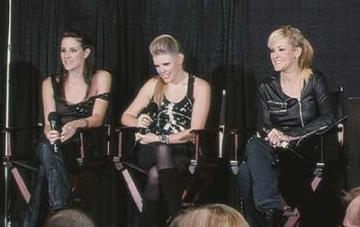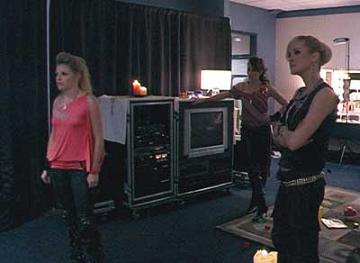Shut Up and Sing


In London in 2003, Natalie Maines, lead singer of the Dixie Chicks, uttered a line that would drastically change everything about them. "Just so you know, we're ashamed the President of the United States is from Texas." The crowd cheered, but within days, country music stations boycotted their music. Fans threw away their music, and they became musical pariahs at home. Filmmakers Barbara Kopple (Havoc, Bearing Witness) and Cecilia Peck followed the band for three years, looking at how Maines, Emily Robison, and Martie Maguire dealt with the aftermath, and the fallout with the industry and with fans.
At the point of the utterance, the Dixie Chicks were one of the biggest things in country music. Their albums and singles topped the charts. They had a fiddle and banjo and played bluegrass, much different from the pseudo-pop favored by some other mega stars. They also looked like they came out of the punk movement. But country music is heavily Republican, and slamming the President was enough to have their fan base revolt against them. Tellingly, none of the Chicks saw this coming. It was a complete surprise to them, and a bit shocking at times. They dealt with it as best they could, touring, avoiding country radio, and best of all, beginning to write about their experiences. This was the first time they wrote their own songs.
It's an interesting look at how far a band is willing to go in order to get their music played. The Dixie Chicks wanted to make music, but radio was not going to let them play music. They were on top of the world, but now were nothing. Shut Up and Sing reveals a lot, but feels a lot like a love-fest towards the Chicks. Kopple and Peck don't quite idolize the Chicks, but do come close. Why were the Chicks shunned when other artists like Bruce Springsteen, Neil Young, John Mellencamp, and Green Day not? Superficially, it may look like it was because they were women, or in country music, or made the comment at the beginning of the war, when Bush was riding high, but it's none of those. Maines made the comment simply to get applause. She was pandering to the audience, and it worked at that moment. The Chicks had no history of making political statements, and the statement itself wasn't very insightful.
Maines apologized, but it had no effect. Worse, every time things seemed to calm down, she stuck her foot in her mouth again, getting into a war of words with artist Toby Keith. It was great marketing, but still bore little fruit. Kopple and Peck focus squarely on the Chicks themselves. While this is great in that it allows the audience a private glimpse at their anger and frustration, it leaves many things unsaid. Maines says that a right-wing blog was responsible for stoking the fires behind her comment. A brief screenshot appears, but the filmmakers never examine this. They interview country music deejays, but not music critics or other industry officials that may say something different about their situations. And aside from a brief mention, they gloss over what the biggest overreaction of the entire mess was - a death threat against Maines. Somebody threatened to shoot and kill her on a specific day during a specific concert.
The bottom line is Shut Up and Sing is about free speech. The Chicks are free to say what they want, and should have the ability to do so. Fans are free to not listen to music if they disagree with the politics of the artist or band. Radio stations should be free to play or not play based on fan reaction, not by mandate. Maines is free to say what she wants about her feelings about Bush and the war, but as long as she does so in the way she does, she will not win any fans over. Her views come off less as coherent and more as from the heart. She is angry, and her personality is not one to apologize for her actions. In fact, she comes off rash a few times. It is great to see the Dixie Chicks channeling their anger and frustration into their writing, and also good to see them getting airplay on non-country radio.